
A holistic approch
To sustainability.
EMPLOYMENT & SOCIAL ASPECTS




GRI Standards
| GRI 401: Employment | Section/Comments | |
|---|---|---|
| GRI 103-1 | Management approach: Explanation of the material topic and its boundary | |
| GRI 103-2 | Management approach: The management approach and its components | |
| GRI 103-3 | Management approach: Evaluation of the management approach | |
| GRI 401-1 | New employee hires and employee turnover | New Employees Hired: 1115 Employee Turnover:837 |
| GRI 401-2 | Benefits provided to full-time employees that are not provided to temporary or part-time employees | Employee Benefits (Note 32, 39) |
| GRI 401-3 | Parental leave | 108 female employees were entitled to parental leave |
KNPL employees

KNPL's diverse workforce comprises of different age groups, gender, religion, nationality, intellectual abilities and professional backgrounds. It focusses on creating a stimulating work environment, supported by a caring and compassionate work ethos to enable employees to thrive and deliver winning performance.
| Gender-wise | Age-wise | ||||
| Male | Female | <30 years | 31-50 years | >50 years | |
| Permanent Employees | 3271 | 108 | 846 | 2252 | 281 |
As of March 31,2023, there was 5480 contractual employees and workers, 5372 of whom were males and 108 of whom were females.
Our focus on Gender Diversity

KNPL has been working towards increasing the scope of hiring female employees. Through consistent identification of unique positions that can be manned by female employees and tie-up with consultants exclusively handling Diversity hiring, we intend on continuing increasing our female workforce.
Currently, women employees are 3.2 % of our permanent employees as compared to 2.3% in previous year.
Employee Training and Development

At KNPL, we don't just offer jobs, we offer a learning experience like none other. We persistently aim to accomplish an atmosphere of edification and enlightenment. Through catalyst for development, we endeavour to create a culture of Collaboration, Innovation and Empowerment.
Categories of Training:

Induction Training - Induction training is provided to new hires as an initial preparation for their new position.

Competency based Training - Competency Based Training emphasizes on enhancing the competencies required by a person for a particular job and position, in order to achieve individual growth and organizational goals.

Functions specific Training - Functional Training aims at upgrading the employees’ functional knowledge to keep up with the ongoing internal and external changes, which affects the day to day working in the short run and the individual & organizational growth in the long run.

Skill Development program - Skill Development programs aims at upgrading and multi skilling the employees’ current skill level by means of Work Instructions, Standard Operating Procedures and Single Point Lessons.

Compliance Training - This is designed to brief employees about key aspects of policies covered under compliance training (Code of Conduct, Code of Conduct for Affirmative Action, Whistle Blower, Appropriate Social Conduct at Workplace, Health-related Ailment Policy) and queries related to the policies are addressed. Awareness is also provided on grievance and complaint redressal mechanism.

Safety Training - To instil a safety culture in the organisation, various thematic safety trainings and competitions such as Kiken Yochi Trainings (KYT), Danger Experience Programme (DEP), Life After Accident (LAA) exercise, trainings on static electricity and human error prevention, online safety tests, safety quiz, and CAPA completion at various levels are conducted.
Sales Trainings:
- KNPL has launched Percipio, a digital academy, to provide upskilling opportunities for employees.
- L&D teams ensure employees have access to virtual mediums for learning opportunities.
- Planned events such as seminars, learning programs, and self-learning modules keep employees connected throughout the year.
- The Product Master Class initiative focuses on continuous learning and upskilling, with subject matter experts sharing their views on technical subjects once a month.
- The Sales Competency Enhancement Programme offers comprehensive training to the sales team on various topics, including the paint industry, technical aspects, product training, scheme management, stakeholder management, digital training, and self-management.
- Nerolac's flagship programme engages with painters and contractors, offering benefits and schemes, including direct transfer of rewards to painters' bank accounts in real-time.
- The Pragati app has been enhanced with additional features for ease of use.
- Over 61,000 painters received advanced training in paint application through classroom sessions or the Mobile Training Academy.
Employee Benefits
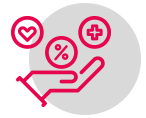
KNPL offers a range of employee benefits, including gratuity and superannuation, medical and life insurance, group accident insurance, maternity leave, pension and other retirement benefits and Provident Fund contributions. In FY 2022-23, a total of 108 permanent female employees were entitled to parental leave. As an organization, we foster an equal opportunity culture within the organization. All recruitments are based on competence, potential and candidate experience with respect to a job profile.
Occupational Health and Safety
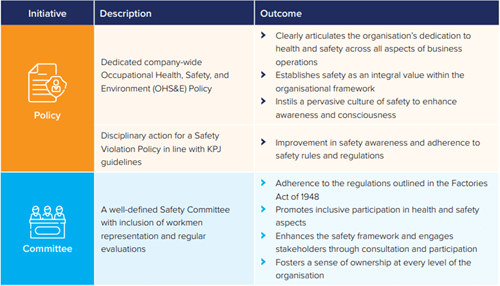
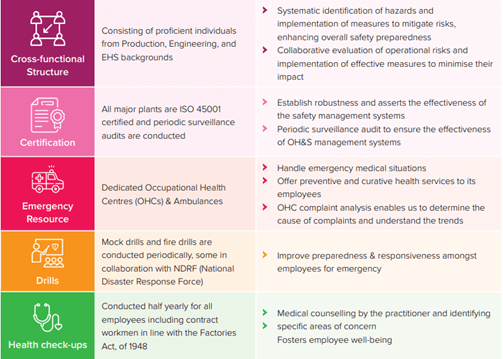
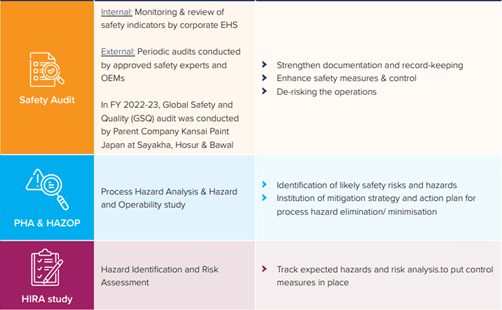
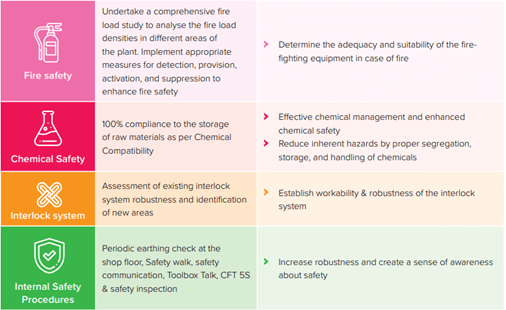
Personal Level Risk Assessment:
Personal level risk assessment (PLRA) is an initiative to encourage individuals to assess the risks associated with their daily occupational and routine activities. It promotes proactive identification and management of potential hazards, such as chemical exposure and proper handling of paint products. By conducting PLRA, individuals prioritize their safety and mitigate risks during paint-related tasks. It is a systematic process of identifying, assessing, and controlling risks associated with individual activities, whether in daily occupational tasks or routine/general life activities. It aims to promote personal safety and well-being by evaluating potential hazards and taking appropriate measures to mitigate or eliminate risks. The goal of PLRA is to eliminate or minimize the likelihood of accidents, injuries, and negative health impacts, fostering a safer environment in occupational settings.
Incident Management:
- Our unwavering dedication to attaining a state of ZERO Incidents. The utilisation of an online, technology-driven SAP EHS module to document, monitor, and promptly address safety issues and compliance requirements.
- Conducting root cause analyses for all safety-related incidents and implementing widespread preventive measures to eliminate their reoccurrence.
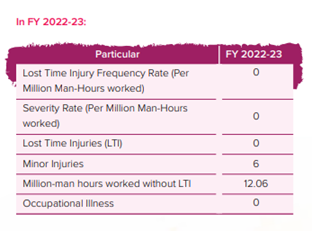
Human Rights

KNPL's commitment to human rights in accordance with internationally accepted standards includes no forced labour / child labour, compliance with minimum wages, no discrimination, gender equality, prevention of sexual or any other form of harassment, occupational safety, employee health and well-being, and is covered by the:
- Company's Code of Conduct Policy
- Policy on Code of Conduct on Affirmative Action
- Policy on Health Related Ailments
- Appropriate Social Conduct at Workplace Policy (including POSH)
- OHS&E Policy
These policies are applicable for the organisation as well as its subsidiaries and group companies. Elements of the human rights have also been included in our policy on Supplier Code of Conduct.
We have an Internal Complaints Committee (IC) consisting of 6 members from different functions including external member. The prime objective of the IC Committee is to ensure effective intervention and timely handling of the matters falling under the Company's Appropriate Social Conduct at Workplace Policy (including POSH). We have aligned our Company Policies in line with UNGC Principle which had been published in last year's Annual Report FY 2022-23.
The Company did not receive any stakeholder complaint regarding human rights during the reporting period. Also, no complaints relating to discrimination, child labour, forced labour, involuntary labour and sexual harassment are filed and pending as of end of the reporting period FY 2022-23.
During the reporting period, we developed a framework for Human Rights Risk Assessment, which assess the impact of areas of concern such as harassment, discrimination, forced labour, child labour, freedom of association, right to collective bargaining, equal remuneration, consumer safety, safe working conditions, health-related ailments, and disabled workforce employability on receptors such as employees, children, community, contractual workers, and customers.


